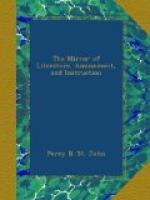Two years ago, a Mr. Smith, a mercantile man from Caraccas, was joined at George Town by a Lieutenant Gullifer, R.N. They proceeded down the Pomeroon river, then up the Wyeena creek, travelled across to the Coioony, sailed down it, and then went up the Essequibo to the Rio Negro, which, it appears, connects the Amazons and Oroonoco rivers. At Bara, on the Rio Negro, Mr. Smith, from sitting so long cramped up in coorials or canoes, became affected with dropsy; and allowing himself to be tapped by an ignorant quack, died after a fortnight’s illness. Lieutenant Gullifer sailed down the Rio Negro to the Amazons, and remained at Para for some months, till he heard from England. From domestic details he received at Para, he fell into low spirits, and proceeded to Trinidad, where, one morning, he was found suspended to a beam under the steeple of the Protestant church! His papers, and Mr. Smith’s, consisting of journals of their travels, were sent to a brother of Lieutenant Gullifer’s, on the Marocco coast of Essequibo, where I went and saw the papers, and was most anxious to obtain them for the Geographical Society; but Mr. Gullifer said that he must consult first with the other relatives.
Among other interesting details I found in the notes, I may mention the following:—High up the Essequibo they fell in with a nation of anthropophagi, of the Carib tribe. The chief received the travellers courteously, and placed before them fish with savoury sauce; which being removed, two human hands were brought in, and a steak of human flesh! The travellers thought that this might be part of a baboon of a new species; however, they declined the invitation to partake, saying that, in travelling, they were not allowed to eat animal food. The chief picked the bones of the hands with excellent appetite, and asked them how they had relished the fruit and the sauce. They replied that the fish was good and the sauce excellent. To which he answered, “Human flesh makes the best sauce for any food; these hands and the fish were all dressed together. You see these Macooshee men, our slaves; we lately captured these people in war, and their wives we eat from time to time.” The travellers were horrified, but concealed their feelings, and before they retired for the night, they remarked that the Macooshee females were confined in a large logie, or shed, surrounded with a stockade of bamboos; so that, daily the fathers, husbands, and brothers of these unfortunate women, saw them brought out, knocked on the head, and devoured by the inhuman cannibals. Lieutenant Gullifer, who was in bad condition, got into his hammock and slept soundly; but Mr. Smith, being in excellent case, walked about all night, fearing that their landlord might take a fancy to a steak of white meat. They afterwards visited a cave, in which was a pool of water; the Indians requested them not to bathe in this, for if they did, they would die before the year was out. They laughed at their monitors and bathed; but sure enough were both “clods of the valley” before the twelvemonth had expired.—Journal of the Geographical Society, Part 2.




